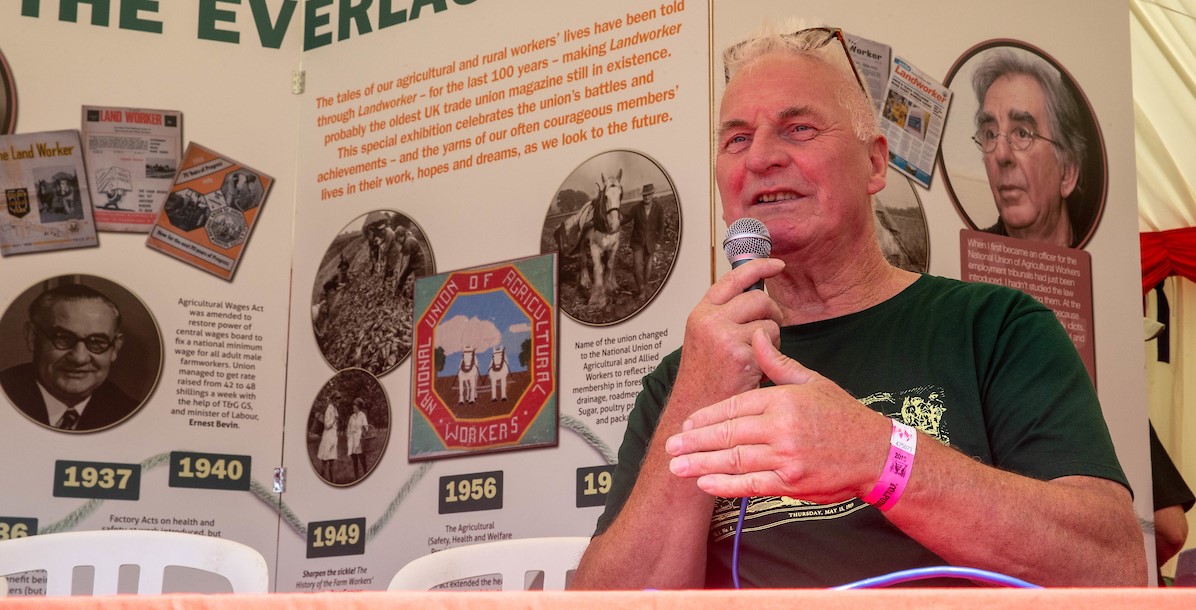Bring back AWB call
The annual Tolpuddle Martyrs’ Festival, held in Dorset each year, commemorates Britain’s first instance of trade unionism, when farmworkers first organised for better pay in 1833.
But nearly two-hundred years after the Tolpuddle Martyrs, agricultural workers are still fighting for fair pay and decent terms and conditions – many face chronically low wages in an industry where accidents and fatalities are high, and they are also at particular risk of exploitation.
It was then fitting that at this year’s Tolpuddle Martyrs’ Festival Labour leader Jeremy Corbyn paid tribute to today’s farmworkers as he announced that his party would reinstate the Agricultural Wages Board (AWB), which was scrapped by the previous Tory government in 2013.
Before it was abolished, the AWB was a government body that regulated wages for agricultural workers. It ensured sustainable wages, sick and holiday pay for farmworkers, and also played a crucial role in maintaining decent standards for their accommodation, among other protections.
Scotland and Wales still maintain their own version of an agricultural wages board but under successive Tory governments, England’s farmworkers have been left behind.
Devastating
A Farmer’s Guardian survey undertaken two years after the AWB was abolished highlighted the devastating impact the decision had had on farmworkers – 70 per cent believed its closure had a negative impact on the industry, with more than 1 in 3 fearing for their jobs, and another 1 in 3 saying their wages had declined.
On Sunday (July 22), Corbyn pledged to bring back the AWB.
“Almost 200 years after the Tolpuddle Martyrs bravely stood against the exploitation of employers paying poverty wages, Labour is committed to reintroducing the Agricultural Wages Board and increasing pay and fundamental rights for all agricultural workers,” he said in a speech announcing Labour’s policy.
“This decision will bring back millions of pounds to workers across the English countryside, in addition to guaranteed paid holiday, sick pay, and rest breaks.
“Rural workers have been consistently ignored by the Tories,” he added. “The south-west is the low pay capital of the UK. Here, and across the English countryside, agricultural workers have been abandoned by the shameful decision to scrap the Agricultural Wages Board.
“The struggle of the Tolpuddle Martyrs sowed the seed for the modern trade union movement and the Labour Party itself. The best way to honour that noble struggle is not just to remember why it took place, but to secure in our time what those workers fought for: the right to fair pay and decent working conditions.”
Unite chair of the agricultural subsector and farmworker Steve Leniec (pictured) hailed the announcement.
“I attended the Festival and was able to personally thank Jeremy Corbyn for making a firm commitment to reinstating the Agricultural Wages Board and returning collective bargaining to the sector,” he said.
“This is a massively positive development and we at Unite welcome the opportunity to work with Defra to develop the future board.”
Leniec criticised a comment from the Tory agricultural minister George Eustice who said in response to Labour’s announcement that the AWB “became redundant” after the government increased the minimum wage.
“At the AWB, we worked long and hard to bring farmworkers who undertake menial jobs above the minimum wage,” Leniec said. “What’s more, the minimum wage doesn’t cover overtime rates and other crucial protections such as enhanced sick and holiday pay. The minimum wage doesn’t have grades and a skills structure that transforms agricultural work from a job into an actual career.”
Brexit impact
As Brexit looms, the AWB becomes even more important, Leniec told UNITElive.
“Even before Brexit, farmers have already reported significant labour shortages. If we want more people to work in agriculture – either by coming into the country to work or encouraging British workers to do so – we need to ensure that the sector is reasonably well remunerated and, more than this, that there are decent terms and conditions.
Leniec added that Brexit could also potentially usher in a food crisis which would require Britain to produce more of its own food.
“The agricultural workforce is ageing and in order to produce more of our own food it is imperative that we encourage younger people into the sector,” he said. “Why would any young person consider agriculture to be a career with a future without that career structure and standard terms and conditions that the AWB provided?”
Now that farmworkers have secured an explicit black-and-white commitment from Labour over the AWB, Leniec said we must all push for a Labour government.
“We need to spread the word throughout rural communities that if we want real, substantive change, it will only be through a Labour government.”
Unite national officer for food and agriculture Joe Clarke agreed, as he too hailed Labour’s commitment to farmworkers.
“This announcement from Jeremy Corbyn is very welcome as since the Agricultural Wages Board was scrapped under the previous Conservative government we have seen an substantial erosion of standard terms and conditions,” he said.
“We are now faced with the unknown implications of Brexit which affect this industry more so than any other, with three million workers employed in the food industry, so this announcement is now more important than ever. Let’s hope we can deliver a Labour government sooner rather than later.”
 Like
Like Follow
Follow


